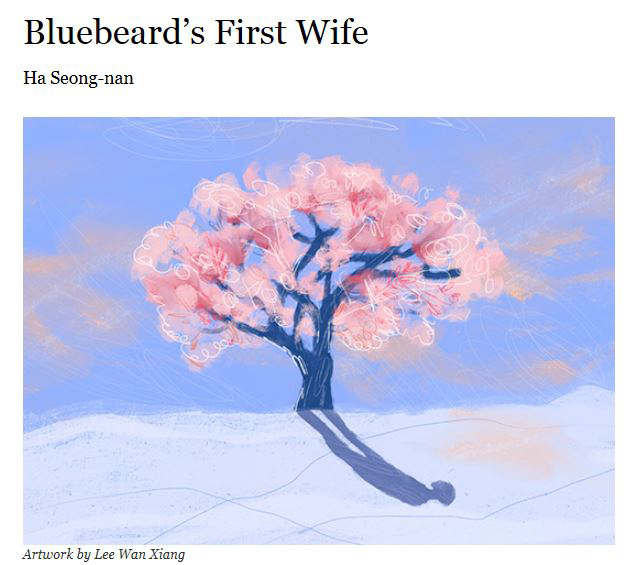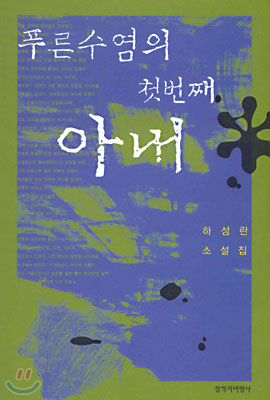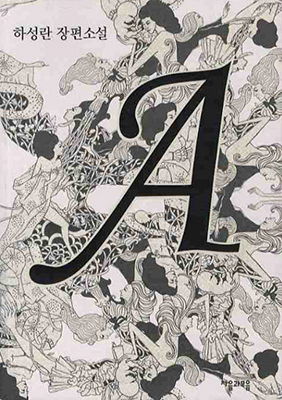|
Ha Seong-Ran, An Author Ready to Talk
2018.07.31
In the April issue of Asymptote, which has a global circulation of 70,000, a book by South Korean author Ha Seong-ran was featured inside. Ha is known for her detailed depictions in her writing and the book that was introduced was Bluebeard’s First Wife (Changbi).
KPIPA Please tell us about yourself.
Ha Seong-ran(Ha below) Since my short novel Grass was selected in a literary competition by Seoul Daily in 1996, I’ve been writing short, long novels and prose. Before I won that award, I had about 10 years of preparation and long before that in school I wrote in literary clubs so I’ve been writing for a long time. When I experience a bit of writer’s block, I think of my middle school years when I used to write short novels. I also think of the novel that won my first award and made me a novelist. In between my pondering‘I can, I can’t ’I’ve written five short story collections, four full-length novels and four books of prose.
KPIPA Recently your work was featured in an online English literary magazine called Asymptote in a competition for up and coming translators. This was Bluebeard’s First Wife that you wrote in 2002. It was meaningful because a Korean novel was introduced overseas in this way.
© https://www.asymptotejournal.com/search/apr-2018/special-feature
Ha Janet Hong, who translated Bluebeard’s First Wife, has been working for a very long time to introduce the works of my colleagues and I to overseas readers. As a result of her toils, Next Door Woman (Changbi) will be published in the United States next year. If my novels stir interest or emotions in readers outside Korea, it will all be thanks to Janet Hong’s translation. Bluebeard’s First Wife was inside a collection of stories I published in 2002 and it was written quite long ago so it’s somewhat different from my current work. Today, you have access to so much news in real time and the gap between then and now is too large. If someone were to ask me why I wrote that kind of story, I doubt I could explain to them why. For me, as the original author, it wasn’t something I kept in mind, but I do think it took too long for Janet, the translator, to reap the benefits.
KPIPA Last April, your serial novel Dark is Dark that was published on Changbi’s literary magazine Literature 3 finally came to an end. We’d like to know what it was like to post a serial novel on the internet while communicating with readers instead of publishing a single paper novel.
Ha Publishing a novel in installments has become so natural. When I first started doing it a very long time ago, I felt it was quite interesting to catch the responses of my readers immediately. It also felt I had to keep them in mind and eye their responses. I also wondered whether I had to change the ending of my stories because of the requests I received. Now I don’t feel much of a difference between publishing on paper and online, but for online stories, I quietly go onto the websites, read the readers’ comments and quietly slip back out.
KPIPA Is there a specific novel you’d like readers outside South Korea to know about?
Ha That would be my full-length novel called A (Consonants and vowels). I wanted to write about how the letter A, which began as a brand in Nathaniel Hawthorne’s Scarlet Letter, changed into a new letter. With a cement company as a backdrop, I tried to delve into mankind by telling the story of a group of only women, their desires and failures.
KPIPA Do tell us about anything new you’re working on, or if there’s anything you’d like to write about in the future.
Ha I don’t know what stories I’ll be writing in the future. I’ve changed, but some of me hasn’t, so I’m sure my future work will be similar to what I’ve done so far. I’ve published three online serial novels so far on magazines and websites and these will be published sometime this year and the next. I’d like to end this interview with an short piece I wrote before one of the three novels was published, called The Fox Woman.
A decade ago I released The Fox Woman in a quarterly publication. The main character of the novel was a fox with nine tails called Gumiho. Gumiho is a well known character from Korean folklore, mainly appearing in scary summer stories and films. It’s a character that's coveted because people say the actresses who play the character will reach stardom and fame. The Gumiho that appears in The Fox Woman has lived for 500 years and she does not know when she will die. Because she has lived for 500 years, she is not looking forward to living 500 more. She is no longer a troll that casts spells and takes on the form of a fox but rather a half-human who lives an everyday life.
Organized by Gwon Ji-hye
|
Pre Megazine
-

Review of Seoul International Book Fair 2017
VOL.1
2017.06 -

Visiting Book Fair Thailand 2017
VOL.1
2017.06 -

Translated and Published in Taiwan, Meet Chin-Myong Kim's THAAD
VOL.1
2017.06 -

Independent Publishing
VOL.2
2017.07 -

A Korean Publisher Growing With the World
VOL.2
2017.07 -

Gilbut Children
VOL.2
2017.07 -

Character Licensing Fair 2017
VOL.2
2017.07 -

The Online and Digital Marketing of South Korea's Publishing Industry
VOL.3
2017.08 -

Golden Bough
VOL.3
2017.08 -

Black Forest
VOL.3
2017.08 -

2017 Korea Book Fair in Vietnam
VOL.3
2017.08 -

Ji-hyeon Lee's Pool
VOL.3
2017.08 -

Characteristics of South Korean Web Novel Platforms and Ventures Overseas
VOL.4
2017.09 -

Publishing Educational Materials for 40 Years “Darakwon”
VOL.4
2017.09 -

Leading the Popularization of Art “Art Books”
VOL.4
2017.09 -

South Korea to Participate in 2017 International Istanbul Book Fair as Guest of Honor
VOL.4
2017.09 -

Haemin Sunim's The Things You Can See Only When You Slow Down
VOL.4
2017.09 -

The Present and Future of South Korea's "Screensellers"
VOL.5
2017.10 -

Humanist Books
VOL.5
2017.10 -

Dolbegae
VOL.5
2017.10 -

The 2017 Guadalajara International Book Fair
VOL.5
2017.10 -

Interview with You-jeong Jeong
VOL.5
2017.10 -

South Korea's Translated Literature Awards, Where Are They Now?
VOL.6
2017.11 -

UU Press
VOL.6
2017.11 -

Risu·Reading Cat Publishing Company
VOL.6
2017.11 -

Asian Publishers Fellowship Program in Seoul 2017
VOL.6
2017.11 -

Interview with author Soon-won Lee
VOL.6
2017.11 -

10 Keywords: South Korea's publishing industry in 2017 at a glance
VOL.7
2017.12 -

"NexusBOOKS"
VOL.7
2017.12 -

"SangSang Publications"
VOL.7
2017.12 -

2017 Bookstore Day
VOL.7
2017.12 -

Interview with Mi-kyoung Song
VOL.7
2017.12 -

Trends and news in South Korea's book design
VOL.8
2018.01 -

Agencies talk actual copyright export cases
VOL.8
2018.01 -

Daewon CI
VOL.8
2018.01 -

K-Books Blossoming in Central America
VOL.8
2018.01 -

Interview with author Jung-hyuk Kim
VOL.8
2018.01 -

Book Factory Dubulu
VOL.9
2018.05 -

Yaong Seoga
VOL.9
2018.05 -

Where Books and People Become Closer
VOL.9
2018.05 -

Interview with author Kim Tak-hwan
VOL.9
2018.05 -

Book Ecosystem Vision Forum - the 3rd
VOL.10
2018.06 -

The Birth of Publishing Company ‘BookGoodCome’
VOL.10
2018.06 -

Diverse Ways to Love Books
VOL.10
2018.06 -

Ha Seong-Ran, An Author Ready to Talk
VOL.11
2018.07 -

2018 Seoul International Book Fair ‘New Definition’
VOL.11
2018.07 -

GOZKNOCK ENT
VOL.11
2018.07 -

South Korea’s Literary Awards
VOL.11
2018.07










